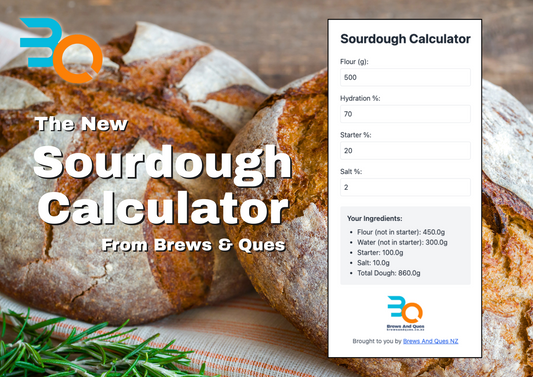Making A Sourdough Starter in NZ 2024
Introduction
Sourdough starter is a living culture of flour and water housing natural wild yeast and bacteria, crucial for leavening and flavouring traditional sourdough bread. The tangy, rich flavor of sourdough bread comes from this fermentation process, which has been used by bakers for thousands of years. In New Zealand, sourdough baking has seen a resurgence, with many home bakers and artisanal bakeries embracing this ancient method.
History of Sourdough in New Zealand
Sourdough's roots trace back to ancient Egypt, but its journey to New Zealand began with early European settlers who brought their bread-making traditions. As these settlers established themselves, they continued to bake bread using natural leavening agents, including sourdough. Over the years, sourdough baking evolved, influenced by local ingredients and climate.
In recent decades, sourdough has experienced a renaissance in New Zealand. Artisanal bakeries and home bakers alike have revived the practice, contributing to a vibrant sourdough culture. This revival is partly driven by a growing interest in traditional, slow-food methods and the health benefits associated with sourdough bread.

Characteristics of Sourdough Starter
A sourdough starter consists of flour and water that ferments over time, fostering wild yeast and lactobacilli. This fermentation process is what gives sourdough bread its distinctive flavor and texture. The yeast provides leavening, making the dough rise, while the lactobacilli contribute to the tangy taste and improve the bread's shelf life.
New Zealand's unique climate and local ingredients impart distinctive qualities to its sourdough starters. The ambient temperature and humidity can affect the fermentation rate, while the mineral content of local water and the specific strains of wild yeast present in the environment influence the starter's flavor profile.
Making a Sourdough Starter
Creating a sourdough starter is a simple process that requires patience and care. Here’s a step-by-step guide to making your own sourdough starter at home:

Ingredients:
- Whole grain flour (rye or whole wheat)
- Filtered water
Day 1:
- Mix 100 grams of whole grain flour with 100 grams of filtered water in a glass jar.
- Stir until well combined and cover loosely with a cloth.
- Let it sit at room temperature (20-25°C) for 24 hours.
Day 2:
- You may start to see bubbles forming. Discard half of the mixture.
- Add 100 grams of whole grain flour and 100 grams of filtered water to the remaining mixture.
- Stir, cover loosely, and let it sit for another 24 hours.
Days 3-7:
- Continue the process of discarding half and feeding with equal parts of flour and water every 24 hours.
- By Day 7, your starter should be bubbly, have a pleasant sour smell, and be ready to use.

Maintaining a Sourdough Starter
Once established, a sourdough starter requires regular feeding to remain active and healthy. Here’s how to maintain it:
Feeding Schedule:
- Daily: If kept at room temperature, feed the starter daily with equal parts flour and water.
- Weekly: If refrigerated, feed the starter once a week. Remove it from the fridge, let it warm up, feed it, and return it to the fridge after it bubbles up.
Troubleshooting Common Issues:
- Hooch: A layer of liquid on top indicates hunger. Stir it back in and feed your starter.
- Mould: Discard the starter if you see mould. Start over with clean equipment.
- Weak Starter: If your starter isn't bubbling, try feeding it with whole grain flour for a few days to boost activity.
Sourdough Baking in New Zealand
New Zealand is home to a thriving sourdough baking community. Artisanal bakeries across the country, from Auckland to Christchurch, have embraced sourdough, offering a variety of loaves that highlight the unique flavours of their starters.
Community and Culture: Sourdough baking is more than just a trend in New Zealand; it's a community-driven movement. Many bakers share their experiences and tips through social media, workshops, and local events. This sense of community helps preserve traditional methods while fostering innovation.

Health Benefits of Sourdough
Sourdough bread is often considered healthier than other types of bread due to its unique fermentation process. Here are some key health benefits:
- Easier Digestion: The fermentation process breaks down gluten, making it easier to digest.
- Lower Glycemic Index: Sourdough bread has a lower glycemic index compared to other breads, leading to more stable blood sugar levels.
- Nutrient Availability: Fermentation increases the availability of nutrients like folate, iron, and magnesium.
Recipes and Variations
Basic Sourdough Bread Recipe:
-
Ingredients:
- 500 grams of bread flour
- 300 grams of water
- 100 grams of active sourdough starter
- 10 grams of salt
-
Instructions:
- Mix flour and water, let it rest (autolyse) for 30 minutes.
- Add starter and salt, mix until incorporated.
- Perform a series of stretch and folds every 30 minutes for 2 hours.
- Let the dough rise until doubled (3-4 hours), then shape and place in a proofing basket.
- Refrigerate overnight.
- Preheat the oven to 250°C with a Dutch oven inside.
- Score the dough, bake in the Dutch oven for 20 minutes covered, then 20 minutes uncovered.

Variations and Unique NZ Recipes:
- Seeded Sourdough: Add a mix of seeds (sunflower, sesame, flax) to the dough for added texture and flavor.
- NZ Honey Sourdough: Incorporate local honey for a touch of sweetness.
- Rye Sourdough: Use a mix of rye and wheat flours for a denser, more flavorful bread.
Challenges and Tips
Common Challenges for Beginners:
- Timing: Understanding when the dough is properly proofed can be tricky. Practice and observation are key.
- Temperature: Maintaining the right fermentation temperature is crucial. Use a thermometer to monitor your kitchen environment.
Expert Tips for Perfect Sourdough:
- Patience: Sourdough baking is a slow process. Don’t rush it.
- Hydration: Adjust the water content based on the flour type and environment.
- Practice: Regular baking will improve your skills and intuition.
Conclusion
Sourdough baking in New Zealand is a testament to the enduring appeal of traditional methods and the vibrant community of bakers who keep these techniques alive. Whether you’re a seasoned baker or a curious beginner, the journey of creating and nurturing a sourdough starter is rewarding.
With the unique characteristics of New Zealand's environment and the rich heritage of sourdough baking, there’s no better time to embrace this age-old practice. Happy baking!
Interested in making your own Sourdough? Make sure to check out our Sourdough Starter Kit; a great place to start your Sourdough journey. It contains all the equipment you'll need to make your first Sourdough bread; from starter through to the finished product!








